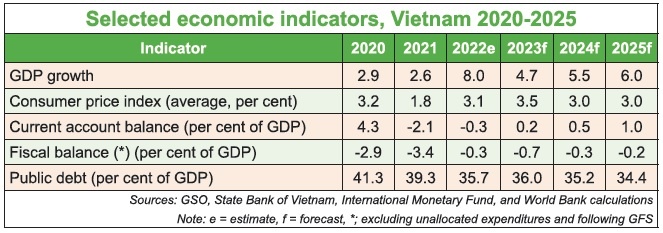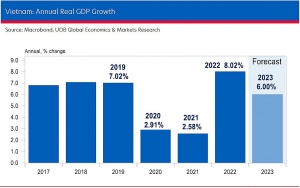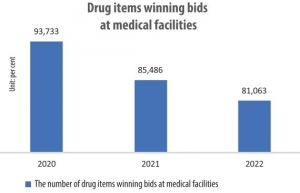CPI level encounters new pressures
Deputy Minister of Industry and Trade Phan Thi Thang last week said that the seven-month consumer price index (CPI) remained higher than that of the same periods of a few years ago.
 |
| Customers are feeling the inflationary pinch with increased prices at the checkout, Le Toan |
“The government’s work in price monitoring is expected to face many difficulties with an expansion in inflationary pressure because prices of many types of materials and strategic items in the world market are set to increase. In addition, risks in exchange rates will continue pressurising the costs for import of materials into the country,” Thang said.
The Ministry of Industry and Trade (MoIT) has pointed out a number of factors that can increase the CPI in the economy from now until the year’s end. They include the increase in basic salary which has entered into force, a climb in electricity prices and consumption and retail services.
“The rise in basic salary from July will help to boost demand in the economy but may also cause negative impacts to businesses and labourers, and may push up the prices in the domestic market,” Thang said.
 |
Under the recently issued Decree No.24/2023/ND-CP, the basic salary climbed from nearly $63 to $76. Decree 24 governs the pay rate for state officials, state employees, and the armed forces.
The basic wage is a basis for calculating salaries of employees in the state-run sector by multiplying it with their corresponding coefficient. As a result, new graduates entering the state sector will get a salary of Level 1 with a coefficient of 2.34, equivalent to a monthly wage of almost $180 at present.
At a government-led press conference organised three weeks ago in Hanoi, MoIT Deputy Minister Do Thang Hai said that the ministry, based on Vietnam Electricity (EVN) proposals, had made a draft regulation for shortening the time for adjusting electricity prices from six months to three months.
“However, because electricity is a vital and sensitive item that can have a direct impact on all business and production, as well as on all macroeconomic targets, the upcoming adjustment of the average electricity price to a specific level would be subject to the prime minister’s direction,” Hai said.
Currently, EVN has the right to adjust the average electricity price by 3-5 per cent as allowed by the government from 2017.
In May, EVN adjusted the average retail electricity price up by 3 per cent. However, the group said that even with this increase, it would still continue suffering losses. Thus, it has proposed an expansion in the price again in September.
It is reported that EVN’s losses hit more than $1.1 billion last year due to a rise in input material prices and high exchange rates, while the average retail electricity price remained unchanged. It is estimated that the loss may amount to over $1.7 billion for the 2023 if no more increase in the price is applied.
“EVN proposed an increase in the average retail electricity price for 2022 and 2023 to ensure money flows to pay for its purchasing power from power plants and to support the group’s financial health,” Hai said.
“With high increases in inputs, largely in fuel prices, it is calculated that the electricity price needs to be revised upwards to ensure finance and monetary flows for EVN.”
According to the General Statistics Office (GSO), a hike in power prices has contributed to the CPI in recent months.
“High increases in the prices of food and electricity have been the key drivers of the CPI, which went up 0.45 per cent on-month and 2.06 per cent on-year in July,” the GSO said. “In the first seven months of this year, the CPI increased 3.12 per cent on-year, while core inflation expanded 4.65 per cent.”
Thus, if the electricity price is increased next month, the CPI will continue going up. The government is expecting to rein in inflation at below 4.5 per cent this year.
Also, according to the GSO, though the consumer price index in the first seven months has been brought under control, it may bounce back strongly in the coming months to come due to an expansion in travelling, and expanded consumption of goods and services.
The total seven-month retail and consumption revenue in the country reached more than $150.8 billion, up 10.4 per cent compared to the same period last year.
Also, the goods retail revenue in the first seven months is estimated to be as much as $117 billion, accounting for nearly 80 per cent of the total and up 9 per cent on-year, in which the price of many important groups of items also expanded, such as food and foodstuff at 12.9 per cent, cultural and educational items at more than 10 per cent, garments and textiles 8.8 per cent, home appliances 3.6 per cent, and travel (except private vehicles) up 1.7 per cent.
The seven-month revenues from travel services are estimated to be nearly $785 million, up nearly 53.6 per cent on-year thanks to a strong rebound in cultural and tourism activities taking place nationwide in July.
According to the World Bank, Vietnam’s CPI is expected to rise slightly from an average 3.1 per cent in 2022 to 3.5 per cent by the end of this year.
“The deflationary impact of slower growth and a VAT rate cut from 10 to 8 per cent rolled out for the second half of 2023 is expected to be more than offset by a civil service salary increase of 20.8 per cent,” the bank said.
“The CPI will moderate to 3 per cent in 2024/2025 based on the expectation of stable commodity and energy prices in 2024.”
FocusEconomics, meanwhile, expects Vietnam’s inflation to average 3.3 per cent in 2023 and 3.4 per cent in 2024.
 | UOB trim GDP growth forecast for Vietnam The strong rebound seen in 2022 is unlikely to be sustainable, with overall growth momentum likely to moderate further in 2023. As a result, UOB has lowered Vietnam’s full-year GDP growth forecast for 2023 to 6 per cent from an earlier call of 6.6 per cent. |
 | Amending legal documents to better control drug prices Drug prices remain among the top concerns of businesses and people in Vietnam. In recent times, although the domestic and international markets have seen volatility, stability has been seen in Vietnam through drug price management specified in the Law on Pharmacy 2016 (LoP), decrees guiding the implementation of the LoP and the Law on Price, and guiding decrees and other relevant legal documents. |
What the stars mean:
★ Poor ★ ★ Promising ★★★ Good ★★★★ Very good ★★★★★ Exceptional
Related Contents
Latest News
More News
- Tet event in Japan celebrates success of 14th National Party Congress (January 25, 2026 | 10:04)
- 14th National Party Congress wraps up with success (January 25, 2026 | 09:49)
- Congratulations from VFF Central Committee's int’l partners to 14th National Party Congress (January 25, 2026 | 09:46)
- List of newly-elected members of 14th Political Bureau announced (January 23, 2026 | 16:27)
- 14th Party Central Committee unanimously elects To Lam as General Secretary (January 23, 2026 | 16:22)
- List of members of 14th Party Central Committee announced (January 23, 2026 | 09:12)
- Highlights of fourth working day of 14th National Party Congress (January 23, 2026 | 09:06)
- Press provides timely, accurate coverage of 14th National Party Congress (January 22, 2026 | 09:49)
- Press release on second working day of 14th National Party Congress (January 22, 2026 | 09:19)
- Minister sets out key directions to promote intrinsic strength of Vietnamese culture (January 22, 2026 | 09:16)

 Tag:
Tag:




















 Mobile Version
Mobile Version